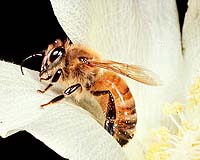 |
Panama City, Panama (SPX) Jan 20, 2010 Figs and the wasps that pollinate them present one of biologists' favorite examples of a beneficial relationship between two different species. In exchange for the pollination service provided by the wasp, the fig fruit provides room and board for the wasp's developing young. However, wasps do not always pollinate the fig. Fig trees "punish" these "cheaters" by dropping unpollinated fruit, killing the wasp's offspring inside, report researchers working at the Smithsonian Tropical Research Institute. Their results, published in the Proceedings of the Royal Society, show that sanctions against cheaters may be critical to maintain the relationship. "Relationships require give and take. We want to know what forces maintain this 80-million-year-old arrangement between figs and their wasp pollinators." said lead author, Charlotte Jander, graduate student in Cornell University's Department of Neurobiology and Behavior, who conducted the study as a Smithsonian pre-doctoral fellow. "What prevents the wasps from reaping the benefits of the relationship without paying the costs?" Some wasp species passively carry pollen that sticks to their bodies. Others actively collect pollen in special pouches. Jander evaluated the ability of six different fig tree-fig wasp species pairs to regulate cheating. She introduced either a single pollen-free wasp, or a wasp carrying pollen, into a mesh bag containing an unpollinated fig. The wasps entered the figs to lay their eggs. Jander found that trees often dropped unpollinated figs before young wasps could mature. "This is really about the all-too-human theme of crime and punishment. We found that in actively pollinated fig species-when wasps expend time and energy to collect and deposit pollen-- wasps that did not provide the basic service of pollination were sanctioned. However, in passively pollinated species-when the wasps do not need to make an effort to pollinate--sanctions were absent," said Allen Herre, STRI staff scientist. "Although we still need to clearly understand the costs associated with applying sanctions, it seems like sanctions were only present where needed." "Sanctions seem to be a necessary force in keeping this, and other, mutually-beneficial relationships on track when being part of a mutualism is costly," said Jander. "In our study, we saw less cheating when sanctions were stronger. Similar results have been found among human societies and in social insects. It is very appealing to think that the same general principles could help maintain cooperation both within and among species."
Share This Article With Planet Earth
Related Links Smithsonian Tropical Research Institute Farming Today - Suppliers and Technology
 Making a buzz: French roads to help honey bees
Making a buzz: French roads to help honey beesParis (AFP) Jan 19, 2010 France is to sow nectar-bearing flowers on the sides of roads in an experiment aimed at helping the honey bee, hit by an alarming worldwide decline, the ministry of sustainable development said on Tuesday. More than 250 kilometres (155 miles) of roadside will be sown in the coming months, launching a three-year test that could be extended to the country's 12,000-kilometer (7,500-mile) networ ... read more |
|
| The content herein, unless otherwise known to be public domain, are Copyright 1995-2009 - SpaceDaily. AFP and UPI Wire Stories are copyright Agence France-Presse and United Press International. ESA Portal Reports are copyright European Space Agency. All NASA sourced material is public domain. Additional copyrights may apply in whole or part to other bona fide parties. Advertising does not imply endorsement,agreement or approval of any opinions, statements or information provided by SpaceDaily on any Web page published or hosted by SpaceDaily. Privacy Statement |